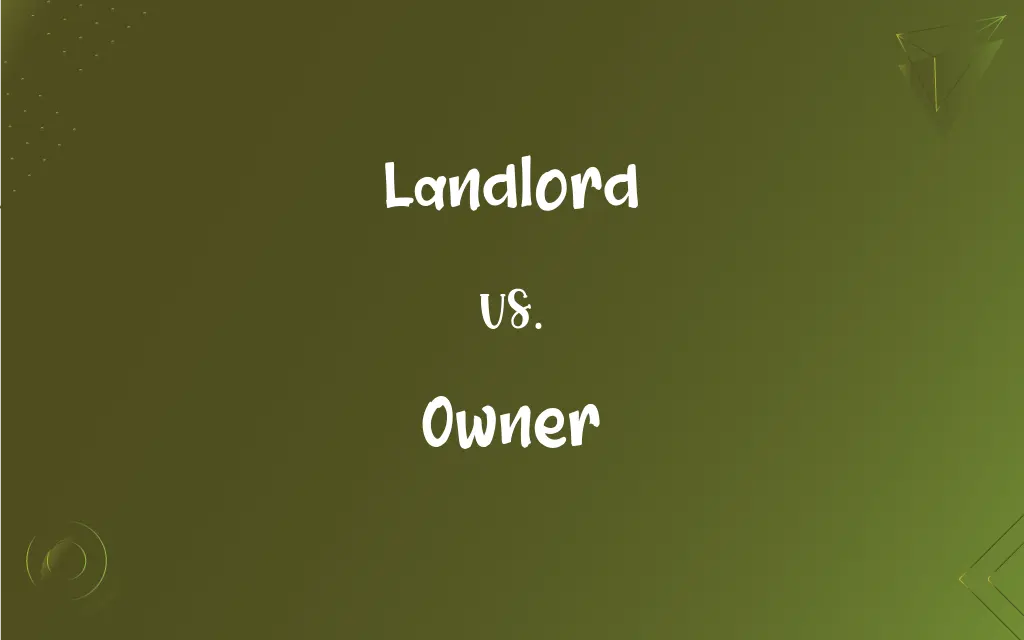Landlord vs. Owner: What's the Difference?
Edited by Aimie Carlson || By Janet White || Published on December 27, 2023
A landlord is a person who rents out property they own, while an owner is someone who holds legal title to an asset, not necessarily renting it out.

Key Differences
A landlord is specifically someone who owns a property and leases it to a tenant, implying a rental relationship. An owner, on the other hand, refers to a person who legally possesses an asset, which may include a wide range of properties, not limited to real estate.
In terms of responsibilities, a landlord is often involved in managing the property, addressing tenant concerns, and ensuring maintenance. An owner, while they may perform similar duties, is not defined by such roles and may simply hold ownership without active involvement.
The term landlord is used in the context of a lease or rental agreement, emphasizing a legal and financial relationship with tenants. Conversely, an owner may not have any such relationships if they don't lease their property.
Financially, landlords receive rent from their tenants, a specific aspect of being a property owner that is engaged in rental activities. An owner, while they may benefit financially from their asset, is not characterized by this rental income.
The legal implications for landlords are tied to tenant laws and rental agreements, whereas for an owner, the legal considerations are broader, encompassing property rights, taxes, and possibly inheritance issues.
ADVERTISEMENT
Comparison Chart
Definition
Person renting out property they own
Individual holding legal title to an asset
Relationship to Property
Typically actively manages and maintains
May or may not be actively involved
Financial Aspect
Earns income through rent
Financial gains not necessarily through rent
Legal Responsibilities
Bound by tenant laws and rental agreements
Subject to broader property laws
Contextual Use
Used in rental/leasing scenarios
Used in a broader sense of ownership
ADVERTISEMENT
Landlord and Owner Definitions
Landlord
A landlord is a person who rents out a property.
The landlord fixed the broken heater in the apartment.
Owner
An owner is an individual with legal rights over a possession.
The owner of the laptop retrieved it from the lost and found.
Landlord
A landlord is a property owner who manages tenant relationships.
The landlord mediated the dispute between the neighbors.
Owner
An owner is a person who legally possesses an asset.
The owner of the car decided to sell it.
Landlord
A landlord is someone who leases land or a building to a tenant.
The landlord signed a new lease agreement with the tenants.
Owner
An owner is someone who has acquired an asset through purchase or inheritance.
The owner of the antique vase displayed it in the museum.
Landlord
A landlord is an owner who receives rent for their property.
The landlord collects rent on the first of every month.
Owner
An owner is someone holding the title to a property.
The owner of the house painted it green.
Landlord
A landlord is an individual responsible for rental property maintenance.
The landlord hired a company to landscape the property.
Owner
An owner is a person who has full control over an asset.
The owner of the company implemented new policies.
Landlord
One that owns and rents land, buildings, or dwelling units.
Owner
Of or belonging to oneself or itself
She makes her own clothes.
Landlord
A man who runs a rooming house or an inn; an innkeeper.
Owner
That which belongs to one
I wanted a room of my own.
Landlord
A person that leases real property; a lessor.
Landlord
The owner or manager of a public house.
Landlord
A shark, imagined as the owner of the surf to be avoided.
Landlord
The lord of a manor, or of land; the owner of land or houses which he leases to a tenant or tenants.
Landlord
The master of an inn or of any form of lodging house; as, the landlord collects the rents on the first of the month.
Upon our arrival at the inn, my companion fetched out the jolly landlord.
Landlord
A landowner who leases to others
FAQs
What are the responsibilities of a landlord?
Landlords are responsible for maintaining the property, complying with housing laws, and respecting tenant rights.
Are landlords always individuals?
Landlords can be individuals, partnerships, corporations, or other legal entities.
What defines a landlord?
A landlord is someone who owns property and rents it out to others.
What defines an owner?
An owner holds the legal title to an asset or property.
Are there different types of property ownership?
Yes, ownership types include sole ownership, joint ownership, and community property.
Does an owner have to actively manage their property?
No, an owner doesn't have to actively manage their property; they may delegate this role.
Can a landlord be someone other than the property owner?
Typically, a landlord is the property owner, but they can also be a management company or agent authorized by the owner.
Can ownership be shared?
Yes, ownership can be held by multiple parties, such as in joint tenancy.
Can an owner use their property for any purpose?
Owners must comply with legal regulations, zoning laws, and community rules.
What legal rights does an owner have?
An owner has the right to use, sell, rent, or transfer their property.
Does being an owner automatically make one a landlord?
No, ownership alone doesn't make one a landlord; they must rent out their property.
Are landlords responsible for property taxes?
Yes, landlords typically pay property taxes, though they may pass these costs to tenants in some lease agreements.
Can an owner be a corporation?
Yes, corporations can own property just like individuals.
Can a landlord sell the property without tenant consent?
Yes, but they must honor the existing lease terms with the tenant.
What happens if a landlord fails to maintain the property?
They may face legal action from tenants and penalties from housing authorities.
Is an owner liable for accidents on their property?
Yes, owners can be liable for accidents, especially if negligence is involved.
Do owners have to disclose property defects when selling?
Yes, most jurisdictions require disclosure of known defects during a sale.
Do landlords need to provide a reason for not renewing a lease?
This depends on local laws; some areas require just cause for non-renewal.
Are landlords required to ensure their properties are habitable?
Yes, landlords must ensure their properties meet basic habitability standards.
Can a landlord enter a rented property without notice?
Generally, landlords must provide notice before entering, except in emergencies.
About Author
Written by
Janet WhiteJanet White has been an esteemed writer and blogger for Difference Wiki. Holding a Master's degree in Science and Medical Journalism from the prestigious Boston University, she has consistently demonstrated her expertise and passion for her field. When she's not immersed in her work, Janet relishes her time exercising, delving into a good book, and cherishing moments with friends and family.
Edited by
Aimie CarlsonAimie Carlson, holding a master's degree in English literature, is a fervent English language enthusiast. She lends her writing talents to Difference Wiki, a prominent website that specializes in comparisons, offering readers insightful analyses that both captivate and inform.






































































